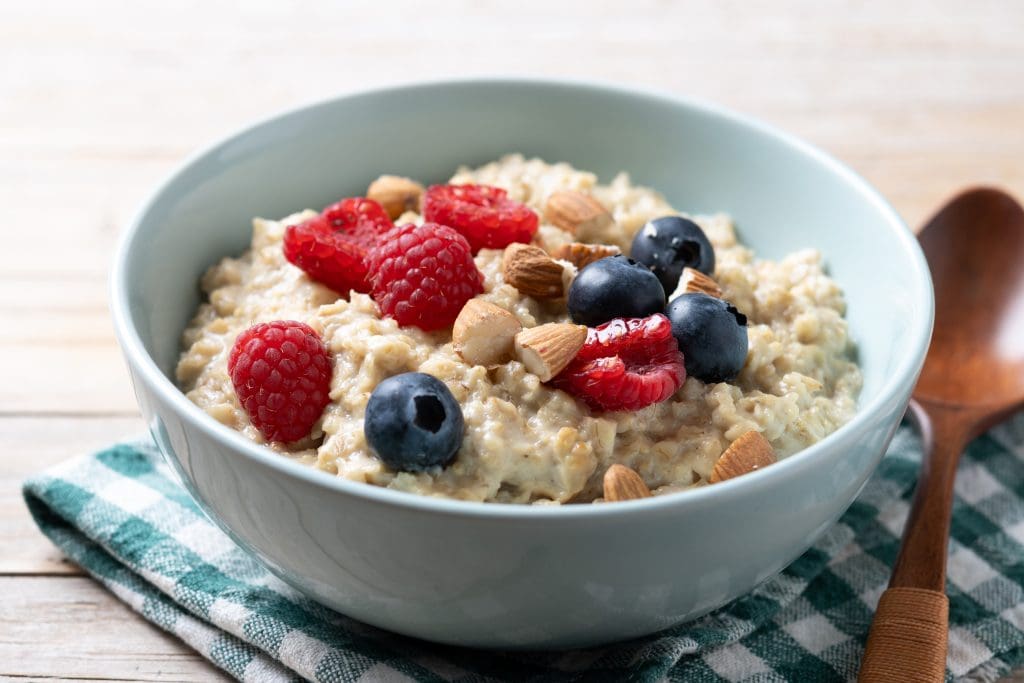Is oatmeal good for your colon? Many people face colon problems, with over 30% of the global population dealing with digestive issues. Oatmeal is seen as a food that might help with colon health.
We look into how oatmeal can benefit the colon. It’s known for its high fiber content. This fiber is key to a healthy digestive system.
Oatmeal is packed with both soluble and insoluble fiber. Soluble fiber turns into a gel in the stomach, making digestion smoother. Insoluble fiber makes stool bulkier, helping it move through the body.
Key Takeaways
- Oatmeal is a rich source of dietary fiber.
- High fiber content in oatmeal supports colon health.
- Oatmeal aids in maintaining a healthy digestive system.
- Both soluble and insoluble fiber in oatmeal play critical roles in digestion.
- Including oatmeal in your diet can help prevent colon issues.

The Relationship Between Diet and Colon Health
What we eat greatly affects our colon health and digestion. Our daily food choices can either help or harm our digestive system, mainly the colon. Eating foods full of nutrients, fiber, and good compounds is key for a healthy colon.
How Food Choices Impact Digestive Function
Our food choices greatly affect how well our digestive system works. Eating lots of processed foods and not enough fiber can cause problems like constipation and an increased risk of colon cancer. But, eating more fruits, veggies, whole grains, and legumes helps our digestive system stay healthy. Oatmeal, being high in fiber, is very important here.
Different foods can affect people differently. But, some foods are known to be good for our digestive health. For example, foods with soluble fiber, like oatmeal, can make stool softer and help us go to the bathroom regularly. Foods with insoluble fiber can make stool bulkier and help it move through our system better.
The Importance of Fiber for Digestive Wellness
Fiber is a key part of a healthy diet, and it’s vital for our colon health. It comes in two types: soluble and insoluble fiber. Soluble fiber, found in oatmeal, turns into a gel-like substance in water. This helps slow down digestion and helps our body absorb nutrients better. It also feeds the good bacteria in our gut, helping our gut microbiome stay healthy.
Insoluble fiber doesn’t dissolve in water and helps make stool bulkier. This helps us go to the bathroom regularly and prevents constipation. Both types of fiber are important for keeping our digestive system balanced and supporting our colon health.
Understanding Oatmeal and Its Nutritional Profile
Oats offer many health benefits, with some being better for digestion than others. Oatmeal is a favorite breakfast, made from different oats. Each type has its own nutritional benefits.
Types of Oats and Their Nutritional Differences
Oats are available in steel-cut, rolled, and instant forms. Steel-cut oats are the least processed. They keep more nutrients and are high in fiber. This makes them great for blood sugar control and digestion.
Rolled oats, or old-fashioned oats, are steamed and rolled. They cook faster but have less nutrition than steel-cut oats. Yet, they’re full of fiber and vitamins.
Instant oats are the most processed. They’re easy to use but often have added sugars and preservatives. This can reduce their health benefits.
Key Nutrients in Oatmeal That Support Digestive Health
Oatmeal is packed with nutrients good for digestion. The main one is fiber. It’s key for a healthy gut.
- Soluble fiber in oatmeal slows digestion and lowers cholesterol.
- Insoluble fiber makes stool bulkier, helping with regular bowel movements.
- Oatmeal also has vitamins and minerals like iron, zinc, and selenium. These are vital for health.
Eating oatmeal can greatly improve digestion, mainly with high-fiber, less processed types. Knowing about different oats helps you choose better for your colon health.
Oatmeal and Colon Health: The Scientific Connection
Scientists have been studying how oatmeal affects colon health. They’ve found some exciting results. It’s clear that oatmeal helps keep the colon healthy.
Research Studies on Oatmeal’s Impact on the Colon
Many studies have looked into oatmeal’s effects on the colon. They’ve focused on its prebiotic properties and how it changes the gut microbiome. These studies show that eating oatmeal can boost good bacteria in the gut, which is key for a healthy colon.
A study in the Journal of Agricultural and Food Chemistry found something interesting. Oat bran, which is high in beta-glucan, increases butyrate in the colon. Butyrate is good because it fights inflammation and keeps the colon lining strong.
| Study | Key Findings | Impact on Colon Health |
| Journal of Agricultural and Food Chemistry | Oat bran increased butyrate production | Improved colon lining integrity |
| Nutrition and Cancer | Oatmeal consumption reduced colon cancer risk | Potential prevention of colon cancer |
| European Journal of Nutrition | Oatmeal improved gut microbiome balance | Enhanced digestive wellness |
Expert Opinions on Oatmeal for Digestive Wellness
Experts in gastroenterology and nutrition talk about oatmeal’s benefits. They say its high fiber content, mainly soluble fiber, helps with digestion. It prevents constipation too.
“Oatmeal is an excellent source of prebiotic fiber, which helps to feed the good bacteria in the gut, promoting a healthy gut microbiome. This, in turn, supports overall colon health.”
Gastroenterologist
The science on oatmeal’s benefits for the colon is strong. Adding oatmeal to your diet can lower the risk of colon problems. It also boosts digestive health.
The Fiber Factor: How Oatmeal Fiber Benefits Your Colon
Oatmeal is packed with fiber, which is key for a healthy colon. It has both soluble and insoluble fiber. These work together to keep your digestive system running smoothly.
The fiber in oatmeal helps you go to the bathroom regularly. It also stops constipation and helps good bacteria in your gut grow. A healthy gut is important for a strong immune system and overall health.
Soluble Fiber in Oatmeal and Its Digestive Benefits
Soluble fiber in oatmeal turns into a gel when it meets water. This gel slows down digestion, helping you absorb nutrients better. It also lowers cholesterol by removing bile acids from your body.
This type of fiber feeds the good bacteria in your gut. A healthy gut microbiome is vital for a strong immune system. It affects your digestive health and overall well-being.
Insoluble Fiber and Its Role in Colon Function
Insoluble fiber doesn’t dissolve in water. It adds bulk to your stool, helping you go to the bathroom regularly. This type of fiber is important for a healthy colon, ensuring waste moves through your system well.
It also helps prevent diverticulitis by reducing pressure on your intestines. Eating foods high in insoluble fiber can lower the risk of colon cancer. This is because it helps remove waste from your colon regularly.
| Fiber Type | Function | Benefits |
| Soluble Fiber | Dissolves in water to form a gel-like substance | Slows down digestion, lowers cholesterol, promotes healthy gut bacteria |
| Insoluble Fiber | Adds bulk to stool | Promotes regular bowel movements, prevents constipation, reduces risk of colon cancer |
A gastroenterologist, says, “Eating foods high in fiber, like oatmeal, can greatly improve colon health. It helps with regular bowel movements and supports a healthy gut microbiome.”
“A high-fiber diet is associated with a lower risk of colon cancer and other digestive disorders.”
” American Journal of Gastroenterology
In conclusion, oatmeal’s fiber is essential for a healthy colon. It includes both soluble and insoluble fiber. Adding oatmeal to your diet supports digestive health and lowers the risk of colon-related disorders.
Beta-Glucan: Oatmeal’s Secret Weapon for Colon Health
Oatmeal has a special compound called beta-glucan that’s great for the colon. Beta-glucan is a type of fiber that boosts the immune system and aids in digestion.
What Is Beta-Glucan and How Does It Work?
Beta-glucan is found in oats and other grains. It boosts the immune system and helps fight off infections. It also keeps the gut healthy and the colon lining strong.
Mechanisms of Beta-Glucan:
- Stimulates immune cells, such as macrophages and natural killer cells
- Enhances the production of cytokines, which are proteins that help fight off infections
- Supports the growth of beneficial gut bacteria
- Helps maintain the integrity of the colon lining
Scientific Evidence of Beta-Glucan’s Benefits for the Colon
Many studies have looked into beta-glucan’s effects on the colon. They found it reduces inflammation, improves gut health, and may lower colon cancer risk.
“The consumption of beta-glucan has been associated with improved immune function and reduced inflammation in the gastrointestinal tract, which can contribute to a lower risk of colon-related disorders.”
A study in the Journal of Nutrition showed beta-glucan lowers colon tumor risk in mice. Another study found it helps gut health and eases IBS symptoms in humans.
| Study | Participants | Outcome |
| Journal of Nutrition | Mice | Reduced incidence of colon tumors |
| Human Study | Patients with IBS | Improved gut health and reduced IBS symptoms |
In summary, beta-glucan in oatmeal is a key nutrient for colon health. It boosts the immune system, supports good gut bacteria, and may lower colon cancer risk. It’s a vital nutrient for digestive health.
Oatmeal as a Prebiotic: Feeding Your Gut Microbiome
Oatmeal does more than just fill you up. It feeds the good bacteria in your gut, helping your digestive system stay healthy. This is key for a balanced gut microbiome, which is vital for your overall health.
How Oatmeal Promotes Beneficial Gut Bacteria
Oatmeal’s special fibers help grow the good bacteria in your gut. The beta-glucan in oatmeal is like food for these microbes. As they break down the fiber, they make short-chain fatty acids. These acids give energy to your colon’s cells and keep your gut healthy.
The Connection Between Gut Microbiome and Colon Health
Your gut microbiome and colon health are closely tied. A balanced gut microbiome helps your colon work right. It aids in digestion, nutrient absorption, and boosts your immune system. But, an imbalance can cause digestive problems and raise the risk of colon diseases.
| Benefit | Description |
| Promotes Beneficial Bacteria | Oatmeal’s soluble fiber acts as a food source for beneficial gut bacteria. |
| Produces Short-Chain Fatty Acids | Fermentation of oatmeal’s fiber by gut bacteria produces short-chain fatty acids, providing energy to colon cells. |
| Supports Colon Health | A healthy gut microbiome, supported by oatmeal, is essential for colon function and overall digestive wellness. |
Butyrate Production: How Oatmeal May Help Prevent Colon Cancer
Butyrate is a short-chain fatty acid that’s key for colon health. Oatmeal might help increase its production. Our colon’s health depends on butyrate, made from dietary fiber in the gut.
Understanding Butyrate and Its Protective Effects
Butyrate fights inflammation and keeps the colon lining strong. It’s the main energy source for colon cells. Butyrate protects against colon cancer in many ways, like controlling gene expression and killing cancer cells.
Studies show butyrate stops cancer cell growth and keeps the colon healthy. This makes butyrate very important for colon health.
How Oatmeal Consumption Increases Butyrate Levels
Oatmeal is full of dietary fiber, like beta-glucan. This fiber is turned into butyrate by gut bacteria. Eating oatmeal boosts butyrate production by giving bacteria what they need. Whole grains, like oatmeal, increase butyrate and other short-chain fatty acids.
Oatmeal’s soluble fiber is fermented by gut bacteria, making butyrate. This supports the colon lining and balances gut bacteria.
- Oatmeal provides soluble fiber that is fermented by gut bacteria.
- The fermentation process produces butyrate, a critical energy source for colonocytes.
- Increased butyrate production supports colon health and may reduce the risk of colon cancer.
In summary, oatmeal is good for colon health by boosting butyrate production. Knowing how butyrate helps and how oatmeal increases it shows the value of what we eat for colon wellness.
Oatmeal for Digestive Regularity and Bowel Movements
Oatmeal is great for your digestive health. It has both soluble and insoluble fiber. This fiber helps keep your bowel movements regular and improves digestion.
How Oatmeal Improves Transit Time and Stool Quality
Oatmeal’s soluble fiber makes stool softer and easier to pass. Its insoluble fiber adds bulk, helping with regular bowel movements. This mix is key for digestive regularity.
Studies show oatmeal can improve how fast food moves through your body. It can also lower the chance of constipation and other digestive problems.
“A diet rich in fiber, such as that provided by oatmeal, is essential for maintaining a healthy gut and preventing constipation,” says a study published in the Journal of Nutrition. This is because fiber helps to regulate the consistency of stool and promote regular bowel movements.
Recommended Daily Intake for Optimal Bowel Function
To get the most from oatmeal, eat the right amount. We suggest at least 1/2 cup of cooked oatmeal every day. You can have it for breakfast or mix it into other meals.
Try to get 25-30 grams of fiber daily from oatmeal, fruits, and veggies. But, increase fiber slowly to avoid discomfort like bloating or gas.
- Start with a small serving size (1/4 cup cooked) and gradually increase it.
- Combine oatmeal with other fiber-rich foods for a balanced diet.
- Adequate hydration is also essential, as it helps fiber move through the digestive system.
By adding oatmeal to your daily meals and following these tips, you can help your bowel movements and digestion stay healthy.
Constipation Relief: Can Oatmeal Help?
Oatmeal might help with constipation, a common problem worldwide. It can cause discomfort and disrupt daily life. Many look for natural remedies, and oatmeal is one option.
Mechanisms Behind Oatmeal’s Constipation-Relieving Properties
Oatmeal’s fiber content is key in relieving constipation. Fiber adds bulk to stool and helps with regular bowel movements. The soluble fiber in oatmeal softens stool, making it easier to pass. The insoluble fiber also helps food move through the digestive system.
Oatmeal also has prebiotic properties. It feeds good gut bacteria, supporting a healthy gut. A healthy gut is vital for regular bowel movements.
How to Use Oatmeal Effectively for Constipation
To get the most out of oatmeal for constipation, eat it correctly. Start with a moderate amount, about 1/2 cup to 1 cup cooked. Increase as needed and as your body adjusts. Remember to drink plenty of water with high-fiber foods like oatmeal.
For the best results, follow these tips:
- Choose high-fiber oatmeal like steel-cut or rolled oats.
- Avoid instant or flavored oatmeals with less fiber and added sugars.
- Pair oatmeal with other fiber-rich foods or fruits for better effects.
- Give it a few days for the fiber’s full benefits to kick in.
By adding oatmeal to your diet and following these tips, you might find relief from constipation. It can also boost your overall digestive health.
Anti-Inflammatory Properties of Oatmeal for Colon Health
Oatmeal is great for colon health because it fights inflammation. We’ll look at how oatmeal helps the colon, focusing on its anti-inflammatory effects.
Inflammation in the Colon: Causes and Concerns
Chronic inflammation in the colon comes from many sources. These include a diet full of processed foods and low in fiber, stress, and genetics. Knowing these causes helps us find ways to prevent and treat it.
Key factors contributing to colon inflammation include diet, lifestyle, and genetics. A diet without important nutrients and fiber makes inflammation worse.
How Oatmeal’s Compounds Reduce Intestinal Inflammation
Oatmeal has compounds that fight inflammation, like antioxidants and beta-glucans. These help the gut stay healthy and improve the gut barrier.
Oatmeal’s soluble fiber, beta-glucan, is key. It helps control the immune system. This reduces harmful inflammation and boosts good inflammation.
Eating oatmeal can help lower colon inflammation and improve overall health. Oatmeal’s antioxidants also protect the colon from damage caused by oxidative stress.
Weight Management and Colon Health: Oatmeal’s Dual Benefits
Oatmeal is great for controlling weight and keeping the colon healthy. Adding oatmeal to your meals can help you manage your weight better and improve your colon’s function.
The Connection Between Body Weight and Colon Function
Keeping a healthy weight is key for good digestion, including the colon. Studies link extra weight to more body inflammation, which harms the colon. Being overweight raises the risk of colon cancer and other digestive problems. Eating oatmeal helps balance your diet and lowers these risks.
Oatmeal’s fiber helps with weight control. High-fiber foods like oatmeal make you feel full longer, preventing overeating and helping you stay at a healthy weight.
How Oatmeal Supports Healthy Weight and Colon Health Simultaneously
Oatmeal’s fiber is good for both weight and colon health. The soluble fiber in oatmeal helps with regular bowel movements and prevents constipation. The insoluble fiber helps remove toxins from your digestive system.
The beta-glucan in oatmeal is great for the colon. It has anti-inflammatory effects and supports good gut bacteria. This helps keep your colon healthy.
Eating oatmeal daily can help with weight and colon health. It shows how important it is to understand the link between weight and colon health. Oatmeal’s nutrients make it a smart choice for better health.
Different Types of Oats: Which Are Best for Your Colon?
Not all oatmeal is the same, and this is true when it comes to colon health. The type of oats you choose can greatly impact your health. Let’s look at the different types of oats and how they affect your colon.
Comparing Digestive Benefits of Various Oat Forms
Oats come in forms like steel-cut, rolled, and instant. Each type is processed differently, which changes its nutritional value and how it’s digested. Steel-cut oats are the least processed and keep more fiber and nutrients, making them great for your colon. Rolled oats are steamed and then rolled into flakes, cooking faster but losing a bit of nutrition. Instant oats are the most processed and often have added sugars and preservatives, which can harm digestion.
A study showed that steel-cut oats have a bigger positive effect on gut health than rolled or instant oats. This is because they have more beta-glucan, a fiber that helps good gut bacteria.
Processing Methods and Their Impact on Nutritional Benefits
The way oats are processed greatly affects their nutritional value. Oats that are minimally processed, like steel-cut, keep more of their natural fiber and nutrients. On the other hand, highly processed oats, like instant, lose some of their nutritional value during processing.
To get the most health benefits from oatmeal, choose oats that are minimally processed. Steel-cut or rolled oats are better choices than instant oats. Also, check labels to avoid oats with added preservatives or sugars to support better digestion.
- Choose steel-cut or rolled oats for higher fiber content.
- Avoid instant oats with added sugars and preservatives.
- Opt for minimally processed oats to maximize nutritional benefits.
Oatmeal Recipes and Preparation Methods for Optimal Colon Benefits
The way you prepare oatmeal can greatly affect its benefits for your colon. It’s important to pick the right methods and ingredients to boost its digestive health.
Basic Preparation Techniques to Maximize Digestive Benefits
To get the most from oatmeal for your colon, use simple yet effective ways to prepare it. Start by cooking it with water or milk. Adding fruits, nuts, or seeds can also make it taste better and more nutritious.
Cooking Methods: Use a 1:2 ratio of oats to liquid. Boil the liquid, then add oats and reduce heat. Simmer for 5-10 minutes, stirring now and then.
Colon-Friendly Oatmeal Recipes and Add-ins
Here are some oatmeal recipes and add-ins that are good for your colon:
- Add sliced bananas or berries for natural sweetness and extra fiber.
- Mix in chopped nuts like almonds or walnuts for a crunchy texture and healthy fats.
- Use seeds like chia or flax for an extra boost of omega-3 fatty acids and fiber.
- Try adding a sprinkle of cinnamon for its anti-inflammatory properties.
Portion Sizes and Frequency Recommendations
To enjoy the colon benefits of oatmeal, eat it in moderation. Aim for a serving size of 1/2 cup to 1 cup cooked. Having oatmeal 3-4 times a week as part of a balanced diet is recommended.
Frequency Tips: Start with a small serving size and gradually increase as your body adjusts. You can also alternate between different types of oats and preparation methods to keep your diet interesting.
By adding these oatmeal recipes and preparation methods to your diet, you can enjoy its colon health benefits. Plus, you’ll get to enjoy delicious and nutritious meals.
Potential Digestive Side Effects of Oatmeal Consumption
Oatmeal is good for many diets, but it can upset some people’s stomachs. Everyone’s body is different. What helps one person might not help another.
Common Digestive Reactions to Increased Oatmeal Intake
Adding more oatmeal to your diet can cause some stomach issues. These might include:
- Bloating and gas: The soluble fiber in oatmeal can make gas.
- Abdominal cramps: The high fiber can cause cramps for some.
- Changes in bowel movements: Oatmeal might make your stool either too hard or too loose.
These problems usually go away as your body gets used to the fiber. But for some, these issues can last or be very bad.
How to Minimize Digestive Discomfort When Adding Oatmeal to Your Diet
To make oatmeal easier on your stomach, try these tips:
- Gradual introduction: Start with a little oatmeal and slowly add more. This lets your gut adjust.
- Adequate hydration: Drink lots of water with oatmeal to help fiber move.
- Choose the right type of oats: Rolled or steel-cut oats might be easier to digest than instant oats.
- Pair with other foods: Mixing oatmeal with fruits or nuts can balance its effects.
By knowing about these side effects and how to avoid them, you can enjoy oatmeal’s health benefits. This way, you support your digestive health too.
Conclusion: Is Oatmeal Truly Beneficial for Your Colon?
Oatmeal is great for your colon health, and the science backs it up. It’s full of fiber, which helps your digestive system work better. The beta-glucan in oatmeal also boosts good bacteria in your gut, making your colon healthier.
Studies show oatmeal can make your bowel movements regular and help with constipation. It might even lower the risk of colon cancer by making butyrate. Plus, oatmeal’s anti-inflammatory effects can reduce inflammation in your intestines, keeping your colon healthy.
Adding oatmeal to your meals is an easy way to support your colon. It’s good for digestion and can reduce inflammation. Try different oatmeal recipes to get the most benefits and feel better overall.
FAQ
What are the benefits of oatmeal for colon health?
Oatmeal is packed with fiber, both soluble and insoluble. This helps with regular bowel movements and supports the gut microbiome. It also reduces the risk of colon cancer. The beta-glucan in oatmeal boosts the immune system, aiding colon health.
How does oatmeal act as a prebiotic?
Oatmeal feeds good gut bacteria, promoting a healthy gut microbiome. This is key for a healthy colon and digestive wellness.
Can oatmeal help relieve constipation?
Yes, oatmeal’s fiber helps regulate bowel movements and relieve constipation. The soluble fiber softens stool, making it easier to pass.
How much oatmeal should I consume for optimal colon health?
For optimal bowel function, aim for 1-2 cups of cooked oatmeal daily. But, start slowly to let your gut adjust.
Are there any potentially digestive side effects of oatmeal consumption?
Some may experience bloating or gas from oatmeal, mainly if new to high-fiber diets. Start slow and drink plenty of water to minimize these effects.
What type of oats is best for colon health?
Steel-cut and rolled oats are great for colon health because they’re less processed. Instant oats, being more processed, have less fiber.
Can oatmeal help reduce the risk of colon cancer?
Yes, oatmeal’s high fiber and butyrate production may lower colon cancer risk. Butyrate has protective effects against colon cancer.
How does oatmeal support weight management and colon health?
Oatmeal’s fiber promotes fullness, aiding weight management. A healthy weight improves colon function and reduces colon-related disorder risks.
Can I add other ingredients to oatmeal to enhance its colon benefits?
Yes, adding fruits, nuts, and seeds to oatmeal boosts its colon benefits. These add fiber, antioxidants, and nutrients for better digestive wellness.
How should I prepare oatmeal to maximize its digestive benefits?
Cook oatmeal with water or milk and use minimal sugar. Avoid over-processing and high-sugar toppings to preserve its colon health benefits.



































